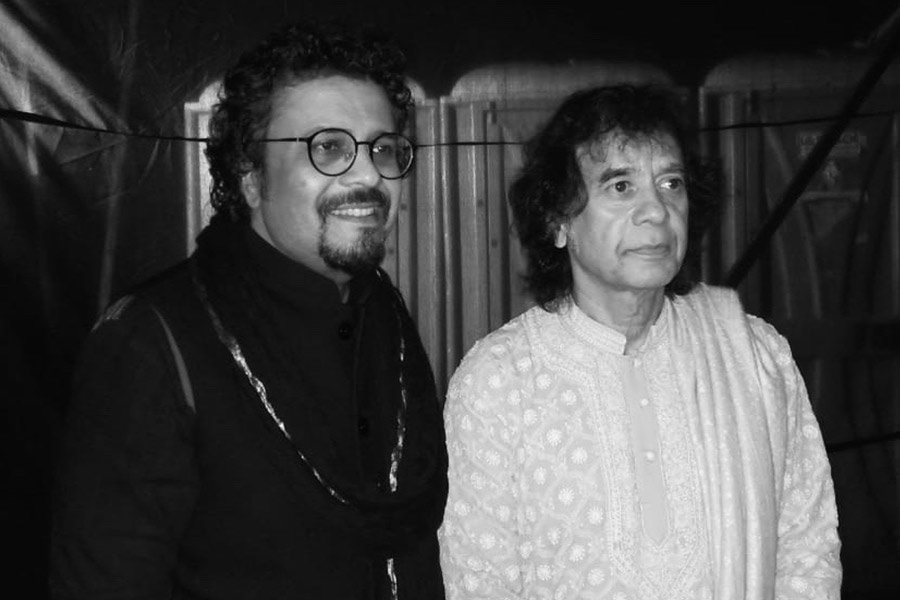I knew Ustad Zakir Hussain all my life, and when I say all my life I mean it literally.
Within a year of my birth, we shifted to the United States, because my parents were teaching at the Ali Akbar College of Music in California. We lived in a two-storey house in San Rafael very close to the college. At that time, Zakir-bhai had just arrived from India and was soaking in the American musical scenario. And, interestingly, he and Pandit Chitresh Das lived on the ground floor of the same house as us. He was probably 18 or 19 then and I was 3 years old.
My father (Pandit Shankar Ghosh) was very busy, he was on tour with Ali Akbar Khan all the time, and my mother was teaching. So, it used to often be that they would leave me with Zakir-bhai, who used to babysit me! And it used to be something that we would often laugh about. A few years ago, at Tata Steel Kalam, we had his book launch and I was in conversation with him.
He jokingly told the audience, ‘Now, he (Bickram) is using a lot of big big words, but you all don’t know that I used to babysit him! He was so small, I used to carry him on my shoulders and roam around. Now he’s asking me big, big questions. I'm having a lot of fun but also feeling like laughing!’ And then he gave me a big kiss on my cheek!
That is the kind of affectionate relationship we had. Whenever we met, he would pull my hair or pull my beard. I still remember he had bought me a Goofy t-shirt as a kid. This was the first phase of my interactions with him. After that we came back to India and since then we would meet on and off, mostly at concerts. I have been to some of his concerts, or we would be playing in the same concert, me going first and him going up on stage last.
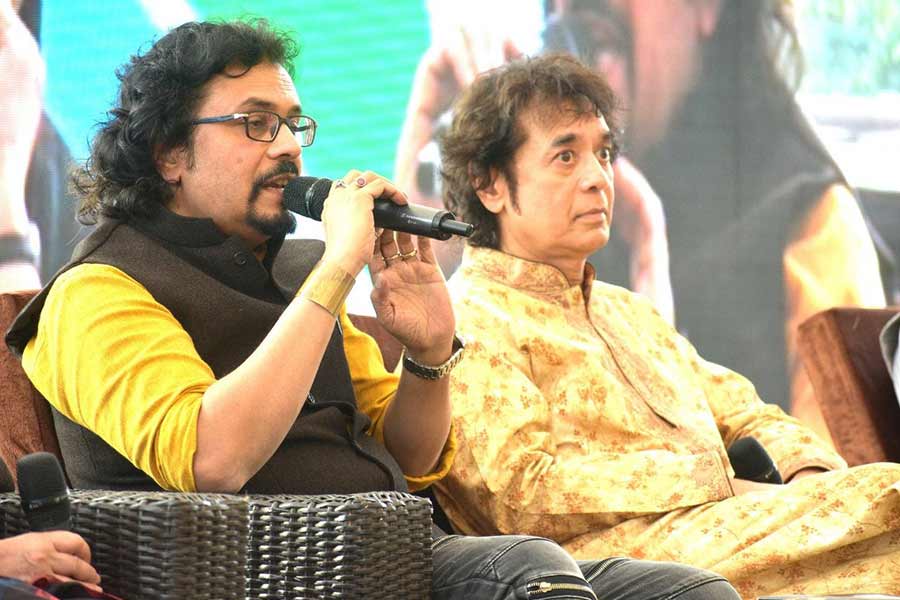
Zakir Hussain once jokingly told the audience, ‘Now, he (Bickram) is using a lot of big big words, but you all don’t know that I used to babysit him! He was so small, I used to carry him on my shoulders and roam around. Now he’s asking me big, big questions…’
But, whenever we would meet, there was recognition of the fact that ‘Shankarda’, my father, was close to him. Since we were living in the same house there was a lot of interaction between them. When my father used to do his riyaz, Zakir-bhai would come and sit and listen. I had a very sweet relationship with him since I was a kid, and that is the kind of relationship that remained between us. Even when I was 55, he was pinching my cheeks!
In 1991, I was just being recognised as a young man who was playing well. In one of the early concerts, I played a North-South jugalbandi with my Guruji Pt. S. Sekhar. It was a new thing at that time because North-South jugalbandhis were not that common. There was an all-night event in Garia, Kolkata. We started the conference and Zakir-bhai was supposed to end it. We were supposed to play at nine o’clock and he was supposed to play at 5am.
We just sat down to play and we suddenly saw Zakir Hussain standing in the wings. I mean he was supposed to play early next morning but he came anyway to hear me play… that was the kind of person he was. He would make that effort and he would come and listen. He was invested. That was his nature. He invested in people’s lives.
‘If you don’t diversify you will not be able to live’
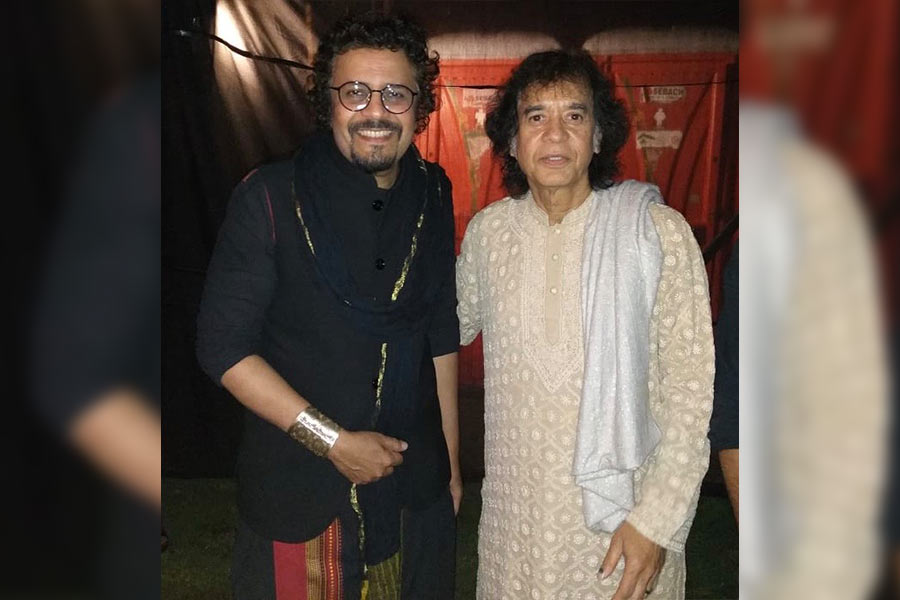
‘My life-work, just like Zakir-bhai’s, was to put tabla on the centrestage’
Another incident happened in 1999, which I will never forget. I was touring the world with Ravi Shankarji. We had gone to a concert of Zakir-bhai with L. Shankar in Los Angeles and backstage, Zakir-bhai asked me what I was doing the next day and invited me for lunch at his hotel. It turned out to be a four-hour-long lunch session. He really delved into me.
The first question he asked me was, ‘Kya kar raha hai? (What are you doing?)’. So I said, I'm playing with Raviji, I'm playing a lot of classical concerts. He said, ‘I know all that, but are you happy and satisfied?’ I could see that he meant it, and that he wanted an answer. So, I said “not really”. He replied, ‘I understand, you are so talented hence this is bound to happen with you. You should diversify, if you don’t diversify you will not be able to live’. And, to be honest, that thought had already started in me, but no one had been able to identify it.
Zakirji saw me very little, but he understood me. He could understand what kind of a person I was. And he understood that there could be this conflict inside me. My life-work, just like Zakir-bhai’s, was to put tabla on the centrestage. We have always been accompanists sitting to the side, always regarded as the second fiddle. And I was not content with that. Not that I didn't like accompanying, but accompanists were often not given their due respect. So, this was already causing a conflict inside me. He recognised that I had the urge and the ability to do other things and that if I got stuck in this construct I wouldn’t be doing justice to myself and I wouldn’t be happy. So he just went for the jugular. He said, ‘you have to do it… you have to diversify’.
I had already started thinking about that. I wanted to make a band and have an album. I was finding it hard to have the courage. But because Zakir-bhai sat me down and gave me such a boost, telling me that no is not an option, I just went for it. He played the catalyst. I took a hiatus from classical music. Then I created a band, I created a sound, I got into this whole thing and he was one of the forces which propelled me. My father also used to say, if you want it so much you should do it but no one else, other than him and Zakir-bhai, told me this.
He was such an intuitive person.
‘I’m so happy and I’m so proud of you’
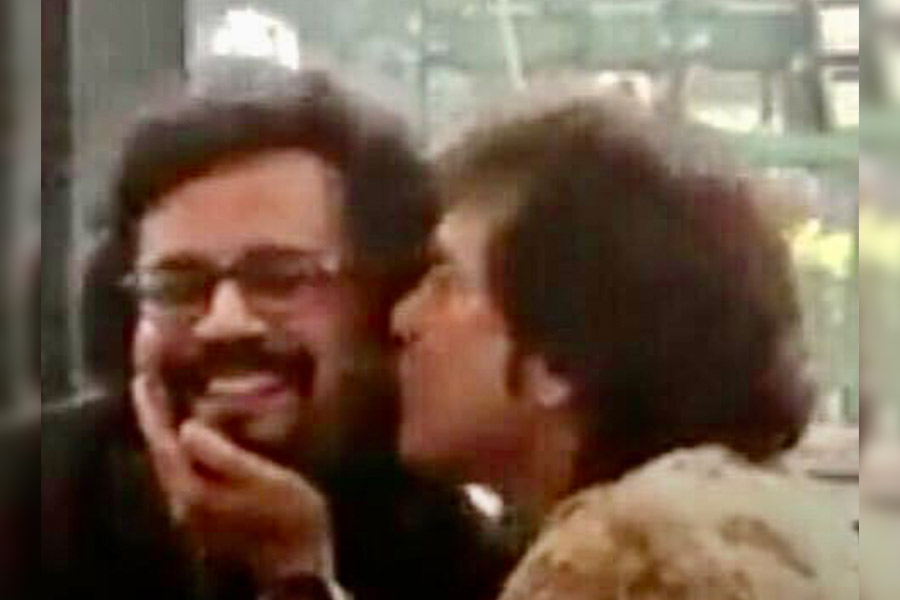
‘We had an affectionate relationship. Whenever we met, he would pull my hair or pull my beard’
So, I went down that path and three to four years later, by God's grace, I had flowered. I was doing my own music, Rhythmscape worked really well and we were doing lots of shows, travelling the world with my own team, with my own band.
When I saw him next at a Shakti concert at Science City, Kolkata, in 2003 he looked at me and said ‘Arrey maine jo bola tu toh bahut seriously le liya (You took what I said really seriously).’ He was laughing so hard!
On December 15 last year, we were in Goa and he was performing at Serendipity that night. Afterwards we were hanging out, laughing and joking together. He was hugging my son and treating him just like he would treat me. He jokingly told my son, pointing to me, ‘don’t listen to him, he doesn’t know anything’. My son was very amused. That night I reminded him of what he had told me 25 years ago. He said, ‘See, I did the right thing, no? Look, you made such an interesting career. You did movies, you did fusion music, now you’re playing so much classical again, you did tabla solos, you did music composition, you're doing curation, all of this it has given you such a rich career and I'm so happy and I'm so proud of you that you did this’.
I can’t believe that one year later, on that same day he was no more.
I was very lucky. If he hadn’t told me what he did, when he did, I might not have found the courage to do what I have done. So somewhere there is a lot of gratitude towards him.
I told him: I’ve spent so much time trying to be like you, but now…
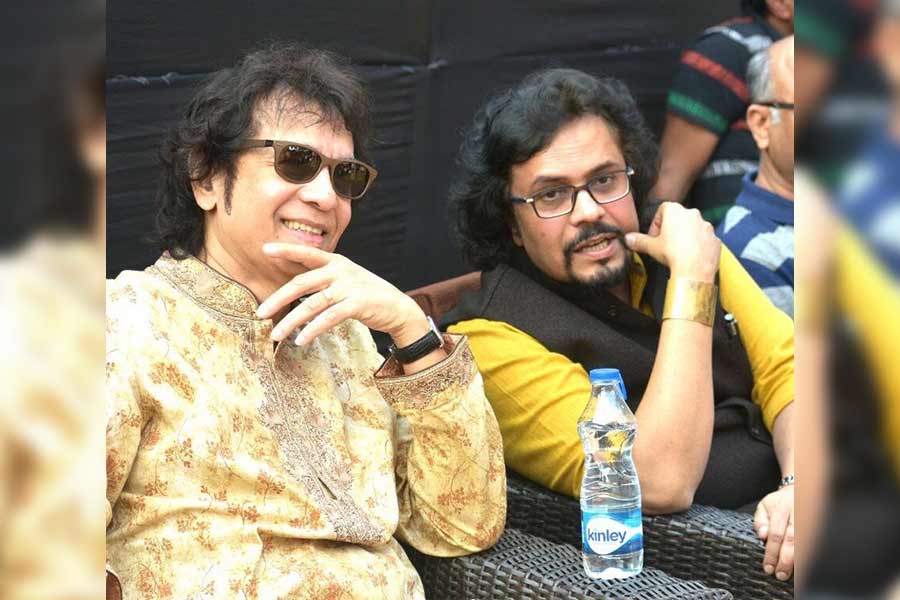
I wanted to achieve a sound production like him, I wanted to make music like him. He had a certain sensuality in his appearance, which was of course something I wanted to emulate, but I wanted that with my own stamp of individuality. He was an inspiration to me in every way
There was a time when Zakir Hussain soared like a comet and everyone wanted to be like him, including me. You know the way he looked, the way he played, his globetrotting lifestyle, he was doing so many things.
There was a phase where it took me time to imbibe his music. I wanted to achieve a sound production like him, I wanted to make music like him. He had a certain sensuality in his appearance, which was of course something I wanted to emulate, but I wanted that with my own stamp of individuality. He was an inspiration to me in every way.
Then I met him again in around 2004, and as per his usual interactions with me, he asked me a question. He asked me what’s going on, and I knew that he already knew what I was doing. I told him I am in a very important phase now. He asked me what that was and I told him, ‘I am trying to get you out of my system now. Otherwise, I'll never be Bikram Ghosh. I’ll be another Zakir Hussain copy’. He asked me what made me think like that and I told him that ‘I’ve spent so much time trying to be like you, now I want to try and be like me. And for that, I have to get you out of my system’. He really appreciated the thought. He said, ‘This is a very valuable thing you have said. You are thinking right. You follow this path and you will go very far.’ So, this was the relationship I had with him. I could talk to him. I could tell him anything.
What did Zakir Hussain mean to tabla? God.
That was the kind of person he was. He would try to help people in his way. He wasn’t self-centred and always humble. I remember we were at the luggage carousel of Bengaluru airport, when Zakir-bhai’s tabla came I went to lift it off the belt but he refused to let me. He said, ‘Aaj tu hai, aur kal tu nahin hoga toh mujhe hi karna parega, why are you spoiling my habit?’
I am having a lot of difficulty calibrating his death…. I just can’t take it…. He was not supposed to die at 73. He was someone who should have lived to cross 90. The spirit he had, he should have lived much longer.
In conclusion…
- What did Zakir Hussain mean to tabla?
God.
- What did Zakir Hussain mean to Indian classical music?
The man who, along with Ravi Shankarji, put Indian classical music on the global stage.
- What did Zakir Hussain mean to me?
Hero.
— As told to Chandreyee Chatterjee
